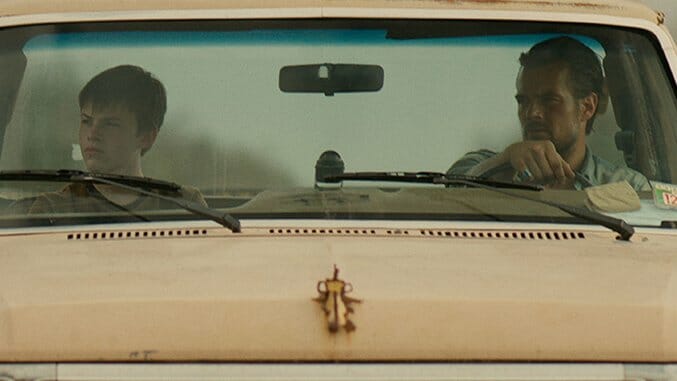
Seventeen minutes into Lost in the Sun, John Wheeler (Josh Duhamel) runs back to the bus stop where he’s abandoned Louis (Josh Wiggins), a recently-orphaned 13-year-old who John picked up at Louis’s mom’s funeral. As he runs, a musical cue which I can only assume is called “John Has an Important, Life Affirming Revelation” swells. This is usually a scene that happens much later in a movie, but Lost in the Sun is super-subversive: It doesn’t even try to pretend you don’t know why John, a petty criminal, would run back to grab the deadweight of which he has just rid himself, even though he doesn’t say why out loud until 100 minutes later.
Twenty minutes in, John, seeing Louis briefly glance at a waiter on roller skates, holds up a half-eaten hamburger that he bafflingly uses as a visual aid while he says the following:
John: Do ya like girls?
Louis: [Fart face].
John: Well, it’s like they say: Hell hath no fury like a woman scorned!
Serious question: Why do shitty movies about manhood always feature male leads who say dumb shit like that? Even more serious question: Why is it that when these male leads say dumb shit like that the diction of their sexism hardly ever makes a lick of sense?
It’s especially weird, because this is a script that is obsessed with diction, verbally, visually, and thematically. Now, to be fair, I don’t think we’re supposed to see John as a great guy. Right before John runs back to that bus stop, he steals the few grand that Louis has in an envelope to pay off a debt, and gets beaten for still coming up short. His way to bond with Louis—a 13-year-old boy whose mother has just died, remember—is to comfort him with a bromide about how all women are vindictively irrational when you upset them. I also get that the point is that Louis has never had a man in his life, so even if John is the bargain basement version of a temporary father figure, maybe he still has something to teach Louis about manhood. What John actually teaches Louis is how to drive, to shoot a gun, and to rob gas station convenience stores, and these things are also viewed negatively throughout the film. What Louis teaches John is how to be a better person, because: Well, because obviously.
The problem is that John’s behavior throughout the entire film is geared towards that 100-minutes-in “twist” that is obvious to anyone who has ever read a story before. And because it’s so obvious, you’re just kind of stuck there, waiting for the string to play out while Duhamel and Wiggins trade so-so dialogue and the people they are about to rob keep talking about what a “good-looking boy” Louis is. And because John ultimately makes the right choice, the movie in retrospect just becomes an hour and a half of John putting off the inevitable.
The only time it’s not boring is also, unfortunately, the point where its dialogue tries to get clever, which makes waiting for that “twist” all the more aggravating. John and Louis meet Mary (Lynn Collins) and Rose (Emma Fuhrmann). Who are also possibly a kidnapping in progress? It’s hard to tell, but Louis and Rose have lengthy conversations about how they’re both stuck with their lot and fantasize about living in a sandcastle while John and Mary fuck and flirt about how the four of them make a nice “family.” Louis says something about Mary being Rose’s mom; Rose says something like “you could say that”; the viewer says something like “we get it already.” What makes this section great is when Mary realizes what (and who) John is, and monologues extensively about how awful he is to Louis. What makes this section less great is that there are fake guns and real guns that scare just the same, and real parents and fake parents who are shitty at parenting, and…we get it already.
An hour and eight minutes into the film, Louis wakes up to find John gone, wanders around the house where they’re squatting, and finds John staring into a sunrise as “Sunrise of New Convictions” swells. Seventy-four minutes into the film, Louis dresses like John willingly; earlier, he had only done that unwillingly when, 55 minutes into the film, Mary made him and Rose dress like mini-versions of John and Mary. One hundred and fifteen minutes into the film we see a scene from Louis’s perspective that we’ve already seen from John’s.
At every minute in this film, you know where it’s going, because nothing that happens in any of the 130 minutes of this film works at all if the movie doesn’t get there. To the movie’s credit, the “twist” itself isn’t played like some huge surprise—the problem instead is in the diction, which alternates between insipid and far too clever, cloyingly restating the obvious over and over without having anything especially interesting to say. And once you realize that the title of the film itself is a pun? By the minute we watch Louis safe at his grandparent’s house smiling at a picture of his parents before we cut to credits; by the minute we see that a ring is a circle and a ring is what John gives Louis; for every minute that circle was just a spinning “wheel” (natch), there’s only one conclusion, which I’ll state as eloquently as the script does: This movie was lost in the pun.
Director: Trey Nelson
Writer: Trey Nelson
Starring: Josh Duhamal, Josh Wiggins, Lynn Collins, Emma Fuhrmann
Release Date: November 6, 2015
Mark Abraham sometimes teaches history in Toronto, is sometimes an Editor at Cokemachineglow, was at one time the co-founder of The Damper, and is always a Bedazzler aficionado. You can follow him on Twitter.